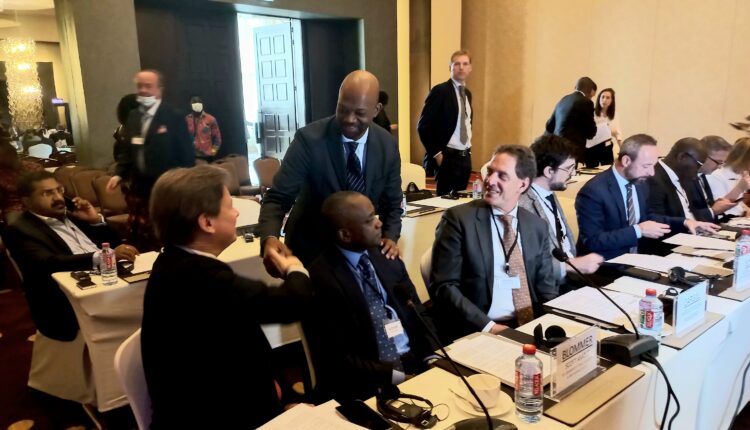Leading multi-national chocolate companies and key industry actors have assembled in Accra, the capital of Ghana, for crunch discussions bordering on cocoa trade at the instance of the Cote d’Ivoire Ghana Cocoa Initiative (CIGCI).
A similar meeting in 2019 with the brand companies birthed the historic Living Income Differential (LID), a $400 per tonne price mechanism for cocoa from Ghana and Cote d’Ivoire agreed to help shore up the incomes of cocoa farmers.
Implementation of the LID, however, has been fraught with challenges with the two global leaders in cocoa production constantly accusing some cocoa buyers and chocolate companies of circumventing the initiative to the disadvantage of millions of poor cocoa farmers.
According to the Cote d’Ivoire – Ghana Cocoa Initiative, the Accra High-Level meeting by the partners has the common purpose of finding a more thriving and sustainable solution to crucial issues bedevilling the cocoa industry, especially farmers.
Director General of the of the Ivorian Conseil du Cafe Cacao, Yves Brahima Kone, decried the worsening conditions of cocoa farmers in the West African region, particularly in Cote d’Ivoire and Ghana.
He encouraged industry to partner the Initiative to tackle the crucial problem of low cocoa prices and unsustainable income levels for cocoa growers.
Origin premium eroded
The Chief Executive of Ghana Cocoa Board, Joseph Boahen Aidoo, intimated that low international market prices for cocoa coupled, in recent time, with the imposition of heavy discounts on origin premiums by buyers posed grave threat to the sustainability of the cocoa industry.
“It’s very disheartening to see premium discounted. Now what is happening is that, once premiums are discounted then it means that industry is telling us to inform our farmers to also discount the quality of the cocoa. But I do not think that’s what the consumer wants,” said Aidoo.
He added, “The consumer wants to have quality cocoa and that’s why they pay the premium to ensure that they will be guaranteed quality cocoa.”
Ethical unfair
Aidoo deemed it ethical unfair to the farmer for cocoa buyers and chocolate companies to the discount origin premium which were institute to ensure quality.
“For us to get premium minus 50, minus 120, I think ethically it is unfair to the farmer. Just as the consumer is asking that there should be no child labour in cocoa, there should be no deforestation, which our farmers are prepared to go that length, we also think that under no circumstance should the quality of the cocoa be reduced. And so premium should not be negative. It should not be discounted,” he explained.
A just share, not fair share
The Cocobod boss assured that producers remain committed to supplying the quality required by consumers, charging buyers to also prioritise a just remuneration comensurate with farmers’ labour.
That he believed occasioned the agreement to introduce the $400 per tonne Living Income Differential (LID) as a measure to shore up the woefully low incomes of the millions of cocoa farmers in Ghana and Cote d’Ivoire.
“For us we believe that the Living Income Differential was to let the farmer get a just share, not fair, but a just share of the price at the international market. Because for the longest while, when it came to sharing the price of cocoa along the value chain the producer was at the disadvantage,” the Cocobod chief executive highlighted.
He acknowledged the positive impact of sustainability programmes by some brand companies, but pointed that coverage remained very low.
Citing the example of Ghana, Mr. Aidoo noted that less than 20% of the over 800,000 smallholder cocoa farmers in the country are involved in sustainability programmes almost 2 decades after introduction.
The Ghana cocoa boss believes the LID to be a sustainable means to tackling farmer poverty, but regretted the actions of the companies was making it a mirage.
“We felt that with the LID every farmer was going to benefit because it is universal, irrespective of the size and scale of the farmer. And 4 years down the lane the story has not changed. The narrative is the same and I think it’s important that we meet and re-apprise what actually went wrong,” he said.
Concluding his opening remarks at the Accra High-Level meeting, Aidoo called for frank and open discussions between the partners to address the issues once and for all.
Finding solutions through partnership
Commenting on behalf of industry, the CEO of Touton, Patrick de Boussac, noted that the problem of cocoa is a bit cyclical.
“Today the world has changed and the farmer after two years of COVID, and one year of difficult macro economy, we are here to find solutions together through a partnership,” de Boussac observed.
The Touton chief executive welcomed the opportunity to sit together with producers to design solutions to the myriad challenges confronting the cocoa and chocolate sector.
“This will allow us to think and tackle all the challenges that await us for the next five years which are deforestation, regulations and find mechanisms or points where the price paid to farmers is reasonable and clear for the long term,” he said.
Participating companies included Hershey, JB cocoa, Touton, Puratos, Sucden, Mondelez International, Nestle, and Barry Callebaut.
Others were ECOM, OFI, Mars, GCB Cocoa, Cargill, Blommer, Tony’s Chocolonely and Ferrero. Present as observers were World Cocoa Foundation (WCF) President Martin Short and Ghana Country Director, Dr Betty Annan.
- Illegal Mining Threatening Ghana’s $230M Cocoa Rehabilitation - April 10, 2024
- Ghana Raises Cocoa Farmgate Price by 58.26% to GHC2,070 per bag - April 5, 2024
- New Standard for Measuring Cocoa Household Income Launched - April 5, 2024
